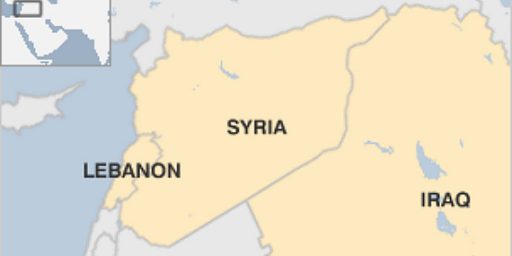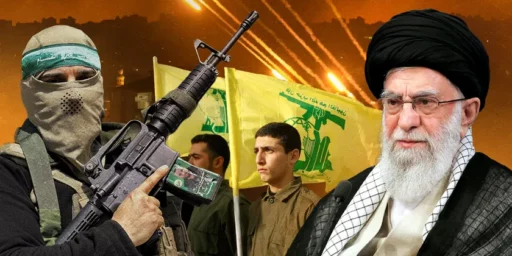Israel-Lebanon War and Democratic Peace Theory
During the early morning hours, I was mulling over the implications of the latest Middle East war for democratic peace theory, mostly in the context of the neoconservative paradigm. It seems others have been having similar thoughts.
Michael J. Totten contends that it “nearly demolishes the theory that democracies don’t go to war with each other. Lebanon, aside from Hezbollah’s state-within-a-state, is a democracy.” Dan Drezner rightly notes, however, that “The ‘aside from Hezbollah’ is an awfully big aside. It suggests that Lebanon might better be coded as a ‘democratizing’ state rather than a stable democracy — and Ed Mansfield and Jack Snyder have demonstrated that democratizing states are the most violent regime type.” Indeed.
Beyond the fact that they have had an election wherein control of governance was legitimately at stake–a necessary but not sufficient condition for coding a state as “democratic”–Lebanon hardly fits the mold. Indeed, it is in much ways less “democratic” than Great Britain circa 1812, the standard rebutal case trotted out by undergraduates and always swatted away.




Not sure I buy it.
Totten’s point would have more point to it if Hezbolhah itself was a democracy, or if the war on Hezbolhah was directed against Lebenon as a whole. Neither is true.
I think a better analogy is US pursuit of Pancho Villa after he raided across the border.
Series of raids across an international border with the side being raided first trying to obtain security by sending more guards to the border.
One raid that proved to much so the raided nation goes after the raiders.
Retaliating country’s military force placed under restrictions by its government aimed at not at ensuring a victory but at minimizing the diplomatic fallout.
The place where the analogy breaks down is the US got permission from Mexico.
Given the acts of Hizbollah and its ability to be a law unto itself within the confines of Lebanon, wouldn’t it be more appropriate to think of Lebanon as a failed state succeptible to terrorists, like the Taliban led Afghanistan, rather than as a democracy?
And that is the defining difference. In effect if not in name, Hezbollah is a state independent of Lebanon, it just happens to exist within the borders of Lebanon. Lebanon did not go to war against Israel, Hezbollah went to war against Israel. The only reason for confusion is that Israel (and the rest of the world for that matter) can’t tell where the state of Hezbollah ends, and Lebanon begins, so they bomb both.
Lebanon and the U.N. clearly enabled Hezbollah, and in some cases, directly assisted them. Certainly, they were far from meeting their obligations under the Resolutions. If they needed help, could have asked. My guess is that they were perfectly well at home with their neighbors.
While Lebanon is not being directly and intentionally attacked by Israel, they are suffering the unfortunate and tragic consequences of their actions.
Charles Austin is 100% correct. Lebanon is not a “state” in any recognizable sense, so that attempts to blame the Lebanese gov’t for Hezbollah’s attacks are misplaced.
Considering the smart people who should know better but don’t, it seems that American insularity is at work. We’ve forgotten that the state monopoly of violence isn’t the normal “state” of affairs.
I’m calling B.S.
If there are violent criminals in my yard, puting my family and neighbors at risk, we’re doing something about it. If we are unable to do so, we request help from the authority that can. Unless, of course, we LIKE criminals…